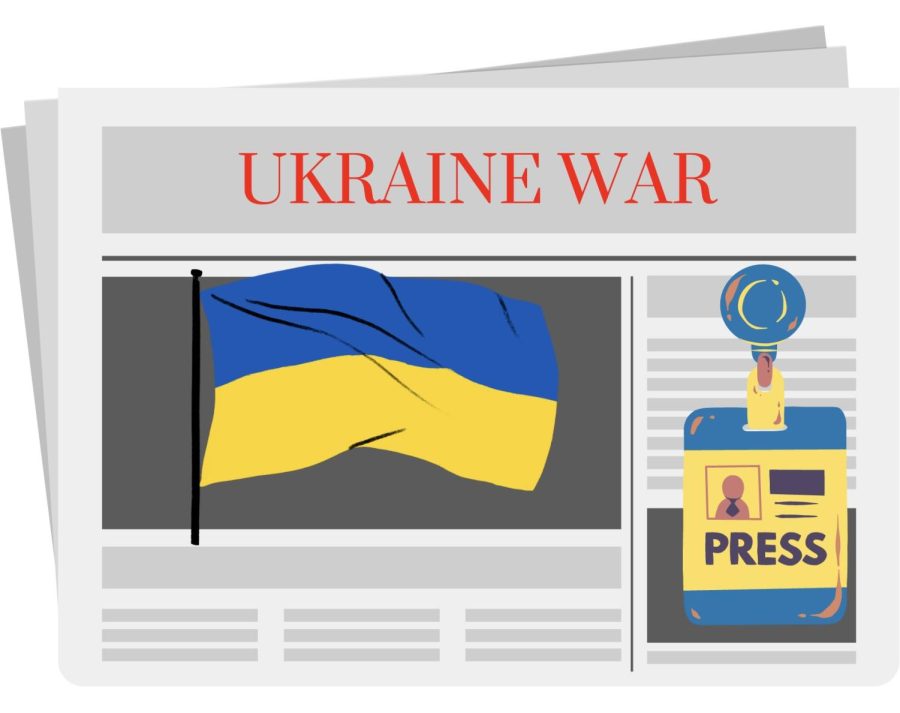Opinion: The racial biases of the Ukrainian war coverage
Credit: Katya Luzarraga
WSPN’s Selena Liu and Katya Luzarraga overview the numerous biases that have circulated throughout the different media outlets.
March 19, 2022
Keeping the credibility of journalism has never been harder, especially now in a time of war. With the invasion of Ukraine by Russia, the world’s bias and prejudice has become strikingly apparent. The media coverage is our only form of knowing what’s happening. However, we’re not getting the whole, unedited truth, so we’re faced with deciding whether the worth of peoples’ lives is solely skin-deep.
What’s happening in Ukraine is undoubtedly horrible, as millions of Ukrainians are being displaced, killed and torn apart from their families. This is a war that has displaced thousands, if not millions, of innocent Ukrainian citizens. These people are struggling to flee their country and struggling to stay alive during bomb raids in subway stations. Innocent civilians are learning how to use assault rifles and struggling to grapple just the slightest sense of security in these horrific, unimaginable times. Ukrainian citizens deserve every ounce of support, aid and love they have received since Russia’s invasion.
The coverage of these events does not truly affect the standard that journalists have been held to. Bias is unavoidable, but to so blatantly showcase unfair biases towards Ukrainian citizens just because they “look like us,” doesn’t make them any more valued than other refugees who have been displaced from their home countries due to heinous wars.
“This is a relatively civilized, relatively European — I have to choose those words carefully, too — city, where you wouldn’t expect that or hope that it’s going to happen,” CBS News senior foreign correspondent Charles D’Agata said.
D’Agata apologized later for his statement, but it has brought into light the racial bias that journalists have. Not only was his statement racist, but it was also historically inaccurate. Reporters covering international events need to be above bias, or there can be no authentic coverage of current events. Are the only civilized places in Europe? No.
“[It is upsetting to see] European people with blue eyes and blonde hair being killed everyday,” Ukraine’s deputy chief prosecutor David Sakvarelidze said.
In the news, it’s important to acknowledge that all people are valued and deserve the same sympathy. Millions of Ukrainian refugees have been fleeing their home country to neighboring countries like Poland, Romania, Hungary and Slovakia. From these European countries, there is no hesitation to take Ukrainians in. Their logic is that they look like “us,” and they practice the same religions as us.
Afghanistan, Syrian and Iraqi people have been fighting a war just like Ukrainians have been, but for much longer. Why don’t most Americans know this? It’s because of the media outlets that have labeled Middle Eastern refugees as a “crisis,” and not as a vulnerable minority. These refugees are not a “thing” to be afraid of; rather, they have a right to be recognized as equal counterparts to their white, blonde-haired Ukrainians.
These racial biases have erupted from past experiences. Reporters who were embedded with American troops in Baghdad during the Iraq War in 2003 saw firsthand the destruction from the early war. They were never able to see the healthy, civilized city that Baghdad looked like before its “liberation.”
“These are not the refugees we are used to, Bulgaria’s Prime Minister Kiril Petkov said. “They are Europeans. Intelligent, educated people. Some are IT programmers. This is not the usual refugee wave of people with an unknown past.”
There are families that aren’t European that are going through the same struggles of war, famine and terror.
“They look like any European family that you would live next door to,” the Qatari channel Al Jazeera English said.
An important thing to remember is that none of these people chose this – they are all victims of war. This horrible thing they have in common should be used to help all of them equally, not divide them.
Bias in the news favoring certain races is manipulation. It leads to a brainwashed generation that has the inability to empathize with any person or situation that is remotely unfamiliar to them. The power of journalism lies with the fact that it is unbiased. We can’t lose that.


























